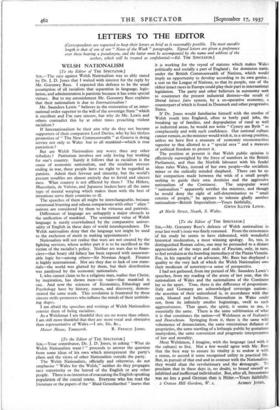[To the Editor of THE SPECTATOR.] SIR,—Your contributor, Dr. J.
D. Jones, in asking " What do Welsh Nationalists want ? " proceeds to answer the question from some ideas of his own which misrepresent the party's plans and the views of other Nationalists outside the party.
The Welsh Nationalists, officially and otherwise, do not emphasise " Wales for the Welsh," neither do they propagate race superiority or the hatred of the English or any other people. There is no intention of evacuating the English-speaking
population of the coastal towns. Everyone who has read the
literature or the papers of the " Blaid Genedlaethol " learns that it is working for the repeal of statutes which makes Wales politically and socially a part of England; for dominion status under the British Commonwealth of Nations, which would imply an opportunity to develop according to its own genius ; a seat on the League of Nations, so that its people, one of the oldest intact races in Europe could play their part in international legislation. The party and other believers in autonomy seek to counteract the present industrial distress—the result of liberal laissez faire system, by a co-operative economy, a counterpart of which is found in Denmark and other progressive States.
If Dr. Jones would familiarise himself with the exodus of Welsh youth into England, often to lowly paid jobs, the breaking up of families, and depopulation of rural as well as industrial areas, he would not write " Cymry am Byth " so complacently and with such confidence. Our national culture cannot remain, as the minister would wish it, in a strong position, unless we have first a measure of economic reconstruction superior to that allotted to a " special area " and a measure of political freedom to protect it.
The position at present is that Welsh public opinion is effectively outweighed by the force of numbers in the British Parliament, and thus the Norfolk labourer 'with his feudal ideas rules Wales, instead of her own people—the socialistic miner or the radically minded shepherd. There can be no fair comparison made between the wish of a small people seeking to guide their own destinies and the aggressive nationalism of the Continent. The unpopular word " nationalism " apparently terrifies the minister, and though he would deny the right of self-determination to " small coteries of people," he appears to tolerate gladly another nationalism—British Imperialism.—Yours faithfully, 48 Harle Street, Neath, S. Wales.
GWYN ILLTYD LEWIS.










































 Previous page
Previous page